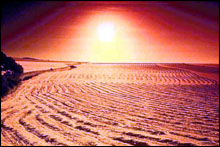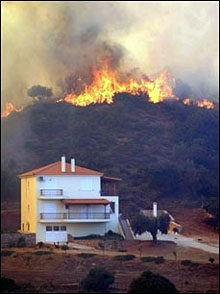Spreading deserts threaten world food supply – UN
|
Spreading deserts and degradation of farm land due to climate change
will pose a serious threat to food supplies for the world's surging
population in coming years, a senior United Nations scientist has
warned.
M.V.K. Sivakumar of the UN's World Meteorological Organisation (WMO) said the crunch could come in just over a decade as all continents see more weather-related disasters like heat waves, floods, landslides and wildfires.
"Should we worry about land being degraded? Yes," Sivakumar, who leads the WMO's agricultural meteorology division, told a news conference in Geneva.
"Today we feed the present world population of 6.3 billion from the 11 per cent of the land surface that can be used for serious food production. The question is: Will we be able to feed the 8.2 billion that we expect to populate the globe in 2020 if even less land is available for farming?" he said.
Africa, Latin America and parts of Asia -- where the climate is already more extreme and arid regions are common -- will be most affected as rainfall declines and its timing becomes less predictable, making water more scarce, he said.
But Europe, particularly around the Mediterranean, would also suffer from heat waves like those that this summer have led to devastating fires in Greece.
Declining rainfall and evaporation of water supplies could also mean less was available for irrigation and for generating electricity for farm machinery, causing lower crop productivity.
Sivakumar said that in some regions the spread of deserts and the salination of once arable land were already well under way. In the future it would be most widespread in drier areas of Latin America, including in farming giant Brazil.
In Africa, increasing climate variability would create major problems for farmers, who are likely to see their growing seasons getting shorter and crop yields cut, especially in areas near already arid and semi-arid regions.
Sivakumar said it was vital for the international community to help put innovative and adaptive land-management practices into action.
These should be targeted at preserving land and water resources. But a return to mixing crops, rather than focusing on single-crop production based on intensive use of fertilisers, could also help face the challenge, he said.
Source: Reuters News Service












